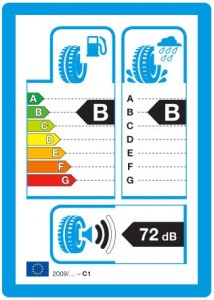EU Tyre labelling regulations – Mobile Tyre Fitting
How to choose the right tyres for mobile tyre fitting
Tyres have always made an important contribution to road safety and to the environmental impact of road transport. However, not all tyres offer the same performance and it was hard for the consumer to know how to choose the most safe and efficient tyres. Luckily the EU tyre regulation that was introduced in 2012 enabled consumers to make more informed choices when buying tyres.
The rationale behind introducing regulation was to improve road safety and to reduce the environmental impact of road transport. Tyres are now graded according to wet grip, fuel efficiency and external noise.
The information is provided on the now familiar EU energy efficiency label. As seen below
To help you understand a little more what this label is telling you lets look at each section in turn…
The three parameters:
Fuel consumption is related to the rolling resistance. By reducing rolling resistance, the tyre consumes less petrol.
A range 7.5% loss of fuel economy between best and worst class for a full set of tyres fitted to an average car.
30% shorter braking distance between best and worst class for a full set of tyres fitted to an average car.
Eg 18 m shorter when braking from 50 mph.




